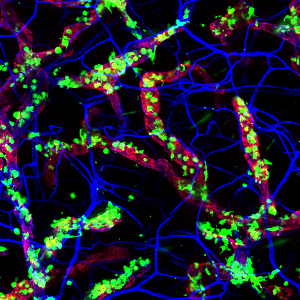The human immune system is an early riser
18 Oct 2021
Swiss and German scientists show that activation of the immune system oscillates throughout the day, with a peak just before the start of the day.
18 Oct 2021
Swiss and German scientists show that activation of the immune system oscillates throughout the day, with a peak just before the start of the day.

Mouse dendritic cells (green) migrating into the lymphatic vessels (red). The blood vessels are in blue. | © UNIGE, Christoph Scheiermann
Circadian clocks, which regulate most of the physiological processes of living beings over a rhythm of about 24 hours, are one of the most fundamental biological mechanisms. By deciphering the cell migration mechanisms underlying the immune response, scientists from the University of Geneva (UNIGE), in Switzerland, and LMU have shown that the activation of the immune system is modulated according to the time of day. Indeed, the migration of immune cells from the skin to the lymph nodes oscillates over a 24-hours period. Immune function is highest in the resting phase, just before activity resumes — in the afternoon for mice, which are nocturnal animals, and early morning for humans, a team led by Christoph Scheiermann, Professor at the Department of Pathology and Immunology at Geneva and at LMU's Biomedical Center, shows. These results, which can be read in the journal Nature Immunology, suggest that the time of day should possibly be taken into account when administering vaccines or immunotherapies against cancer, in order to increase their effectiveness.
Stephan J. Holtkamp, Louise M. Ince, Coline Barnoud, Madeleine T. Schmitt, Flore Sinturel, Violetta Pilorz, Robert Pick, Stéphane Jemelin, Michael Mühlstädt, Wolf-Henning Boehncke, Jasmin Weber, David Laubender, Julia Philippou-Massier, Chien-Sin Chen, Leonie Holtermann, Dietmar Vestweber, Markus Sperandio, Barbara U. Schraml, Cornelia Halin, Charna Dibner, Henrik Oster, Jörg Renkawitz and Christoph Scheiermann: Circadian clocks guide dendritic cells into skin lymphatics. Nature Immunology, 2021